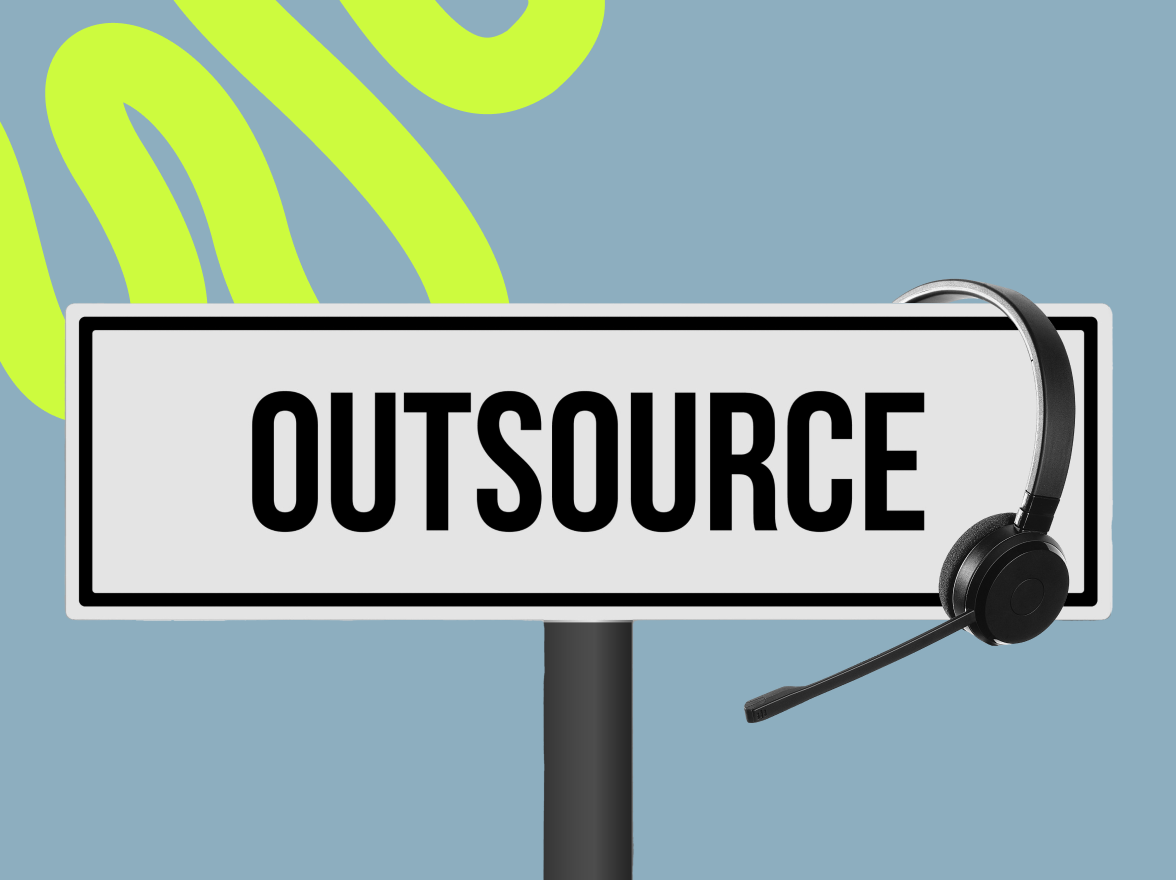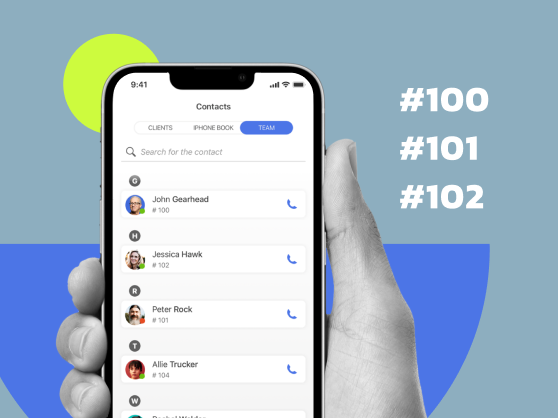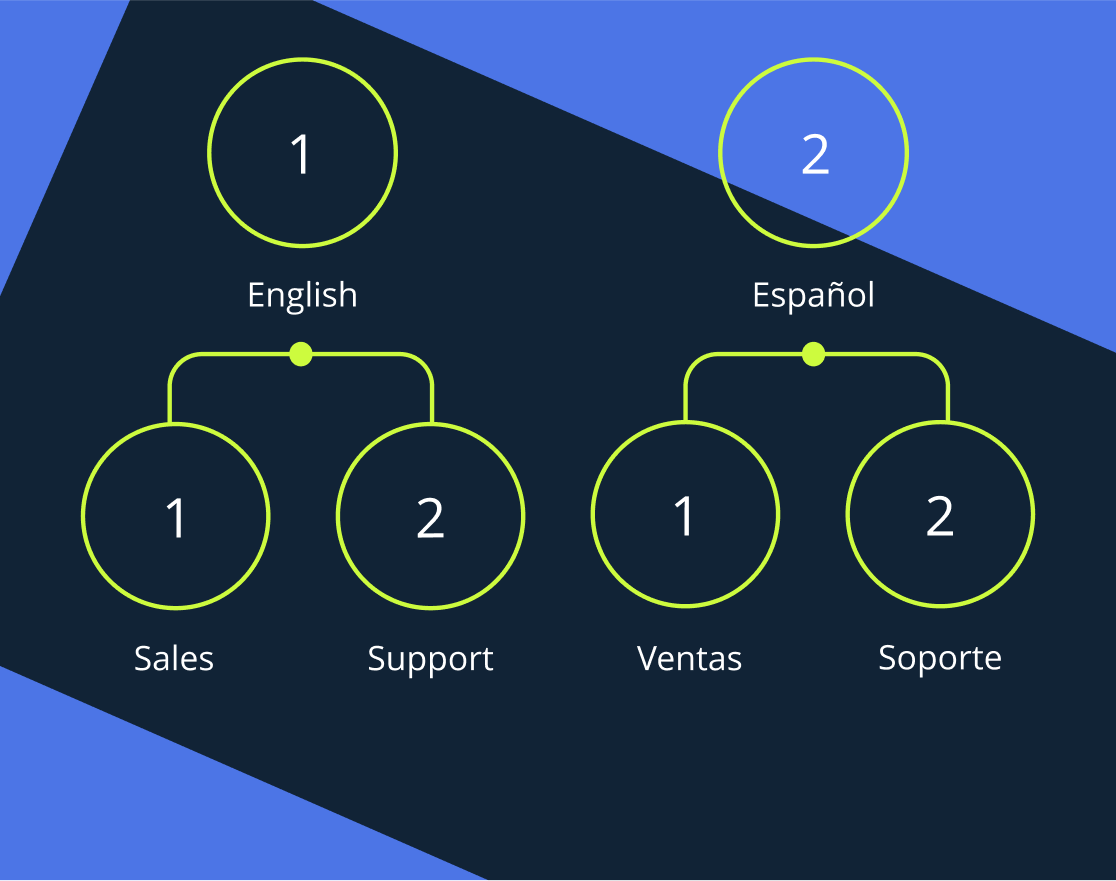Call center outsourcing offers businesses an opportunity to improve client service and manage costs by tapping into external expertise and advanced technology. However, it also comes with challenges, including potential issues with service quality and cultural alignment. This article will delve into the benefits and drawbacks of outsourcing call centers and provide best practices to help businesses make the most of this strategy while minimizing risks.
What is contact or call center outsourcing?
Contact/call center outsourcing involves hiring an external service provider to manage customer interactions on behalf of another company. What call center outsourcing is, contrasts with in-house call centers where staff are direct employees of the company they represent. It can offer flexibility and potentially lower costs, while in-house centers allow for more direct control over operations.
Call center outsourcing businesses handle two main types of communication: incoming and outgoing. Incoming (or inbound) centers focus on managing incoming customer inquiries and support requests, while outgoing (or outbound) centers are proactive, making calls to customers for telemarketing, customer updates, or feedback collection.
Types of call center outsourcing
Call center outsourcing models vary based on location relative to the hiring company. The three primary models are offshore, nearshore, and onshore outsourcing.
- Offshore outsourcing: This model involves relocating call center operations to a country far from the hiring company’s location, often where labor costs are significantly lower. It allows companies to save on expenses but can introduce challenges such as cultural and language differences.
- Nearshore outsourcing: Nearshore call center services are outsourced in countries that are geographically closer to the client’s nation. This model offers a balance, maintaining lower costs while reducing the cultural and time zone differences seen with offshore outsourcing.
- Onshore outsourcing: Also known as domestic outsourcing, this model keeps call center operations within the hiring company’s country. While it tends to be the most expensive among the three due to higher labor costs, it increases compatibility with the company’s culture and language, enhancing customer interaction quality.
How does call center outsourcing work?
The call centers process outsourcing via several steps to ensure a smooth operation and integration with the client’s existing systems. Here is how it typically operates:
- Selection of a service provider: Companies assess various outsourcing service providers, considering factors like cost, expertise, and geographic location. They select a provider that aligns with their needs and strategic goals.
- Contract and agreement: The company and the provider finalize terms covering scope, service levels, performance metrics, and compliance requirements in a formal contract.
- Integration of systems: The outsourcing provider integrates its systems with the client’s internal software and customer relationship management (CRM) tools. This integration ensures that data flows between both parties and that customer information remains updated and accessible.
- Training and onboarding: The provider’s call center agents are trained on the client’s products, services, and client service protocols to ensure consistency in customer interactions.
- Launch operations: After training, the outsourced call center services go live. Providers often start with a pilot phase to iron out any issues before full-scale operation.
- Ongoing management and quality assurance: Both the client and the service provider continuously monitor and review performance metrics. Regular feedback and adjustments help improve service quality and customer satisfaction.
- Reporting and communication: Regular reports on operations and customer interactions are shared with the client. These reports help in tracking progress against agreed metrics and are vital for strategic decision-making.
Outsourcing call center services: A MightyCall customer’s experience
Let’s look at how Black Creek Management Group, a MightyCall customer, successfully outsources call center services to improve its operations and reduce cost. Jason Elsen, the founder of Black Creek Management Group, shared his insights on managing an outsourced outbound call center to achieve business goals in the collections industry.
Black Creek Management Group’s call center is an example of nearshore outsourcing: while Jason runs his business from California, the outbound call center he partnered with, MM Online Contact Center, is based in Tijuana, Mexico. This strategy is highly effective due to geographical proximity, time zone alignment, and affordability.
By pairing his outsourcing strategy with the right tools, such as MightyCall, Jason can delegate outbound calls while still maintaining complete oversight of the process. This approach has led to a significant increase in call volume—4x higher—at a fraction of the cost, making it 10 times cheaper in comparison with their previous communication service provider.
Jason also highlighted how MightyCall’s features enhance this setup:

“We listen live with MightyCall, but we can take over the call if we want from the agent and we can barge in and tell the agent so that the client gets here or tell the agent, ‘Hey, say this, say that’.”
This flexibility provided by outsourcing the contact center allows Jason to maintain control over customer interactions, all while having the cost advantage.
Benefits of call center outsourcing services
Lower spendings
Outsourcing customer service calls can lead to significant cost reductions for companies. By transferring these services to providers in regions with lower labor costs, businesses can save on salaries and infrastructure expenses. Additionally, outsourcing eliminates the need for investing in call center technology and training, further lowering operational costs.
Access to specialized expertise
Outsourcing partners often bring specialized knowledge and expertise in managing customer interactions across various industries. This expertise helps in delivering quality service and handling complex queries. For instance, a tech company might partner with a solution that specializes in tech support, thus ensuring customers receive informed and accurate help.
Scalability
Call center outsourcing companies provide the flexibility to scale operations up or down based on demand. During peak seasons, outsourced centers can quickly add more agents to handle increased call volumes, ensuring client service levels remain high without permanent overhead.
Professional customer service
With round-the-clock operations and multilingual support, outsourced call centers can offer extended client service that might be too costly or complex to manage in-house. This 24/7 availability ensures that customer needs are met promptly, doing good for the overall satisfaction and retention.
Focus on core business functions
By outsourcing non-core activities like client service, companies can focus their resources on areas that directly contribute to their core business objectives. This strategic focus can lead to innovations and improvements in primary functions, driving growth and competitiveness.
Drawbacks of outsourced call center
There are disadvantages of call center outsourcing:
Loss of control over customer service quality
When moving the contact center operations, companies might face a loss of control over the quality of client service. External service providers may not always adhere strictly to the hiring company’s service standards or fully understand its products, potentially leading to a decline in customer satisfaction. To mitigate this, it’s crucial for companies to set clear service level agreements (SLAs), perform regular training with the outsourcing staff, and conduct consistent quality checks.
Communication barriers
Communication challenges such as language differences and cultural mismatches can impact the effectiveness of outsourced call centers. These barriers can frustrate customers and lead to misunderstandings. Companies can address these issues by selecting outsourcing partners with strong language skills and cultural training programs. Additionally, providing training on the company’s products and customer handling techniques can bridge these gaps.
Hidden costs
Outsourcing can introduce unexpected costs, including setup fees, training expenses, and charges for services not included in the initial contract. These hidden costs can offset the anticipated savings from outsourcing. Companies should seek to include detailed, transparent cost structures in their contracts and negotiate fixed pricing where possible to manage these expenses better.
Risk of data security breaches
Sharing sensitive customer data with third-party providers increases the risk of security breaches. To protect data, companies should choose call center outsourced partners who comply with international data security standards and conduct regular security audits. Implementing strong data protection agreements and continuous monitoring can further secure customer information.
By proactively addressing these drawbacks, companies can better leverage the advantages of outsourcing while minimizing its potential risks.
Alternatives to outsourcing call center operations
One viable alternative to outsourced call center solutions is adopting advanced call center software. This technology can serve as a complete solution for businesses looking to maintain control over their client service while improving their operations. Advanced software platforms can automate routine inquiries, route calls to the appropriate department, and provide detailed analytics, reducing the need for external support.
Here are key benefits for businesses set on in-house call handling via software:
- Clear information on customer interactions: Provides real-time data and feedback, ensuring services align with company quality standards, thereby fostering consistency and reliability.
- Effective training and monitoring tools: Helps overcome common outsourcing challenges such as quality control and communication barriers by equipping in-house teams with the necessary tools to maintain high service standards.
- Reduced dependency on external support: By routing calls within the organization, businesses can handle customer inquiries faster and with greater personalization, leading to improved customer satisfaction.
- Direct control over operations: Allows businesses to adapt to changing customer needs and market conditions without the complexities of coordinating with an external service provider.
Adopting modern call center software can improve operations without the need for an outsourced contact center. By focusing on improving in-house skillset, companies can achieve greater control, customization, and quick adaptation to customer needs, positioning themselves for success in a competitive market.
Call center outsourcing costs
The financial structure of outsourcing is multifaceted, involving initial and ongoing expenses distinctly different from maintaining in-house operations. According to the Deloitte Global Outsourcing Survey 2022, outsourcing can lead to considerable cost savings, primarily due to reduced labor costs and lower investments in technology infrastructure.
- Initial costs: These include setup fees, which cover the integration of systems and training of the outsourced staff to ensure alignment with the company’s standards and practices.
- Ongoing costs: These are typically variable, based on the service levels agreed upon and the volume of interactions handled by the call center outsourced. Monthly service fees can fluctuate with the scale of service provided, adjusting as business needs change.
- Comparison with in-house operations: In-house contact centers require significant capital investment in technology, facilities, and workforce training. Moreover, the fixed nature of these costs means they are less adaptable to changes in demand compared to the more flexible cost structure of outsourced services.
- Cost: The Deloitte survey highlights that organizations leveraging outsourcing can see reductions in overall customer care costs by 30-40%. This comes not only from lower direct costs but also from the ability to scale operations more dynamically according to demand without the same level of financial risk or commitment.
- Strategic financial management: Companies are increasingly looking at outsourcing not just as a cost-cutting measure but as a strategic tool that offers access to specialized talent and advanced technologies, which can be cost-prohibitive to develop in-house.
Outsourcing, therefore, provides a compelling financial model for companies looking to optimize costs while maintaining flexibility in scaling.
Example
For example, imagine a major U.S. telecommunications company that outsourced its customer care to the Philippines. Here’s the breakdown of the potential financial benefits of call center outsourcing:
- Initial transition costs: The company incurred setup costs, including training for the outsourced team, managed by the provider, reducing the need for large upfront investments.
- Ongoing operational savings: By outsourcing, the company benefited from lower labor costs and improved productivity, leading to shorter call times and higher customer satisfaction.
- Scalability and flexibility: The flexible setup allowed the company to easily scale operations during peak demand periods without additional capital investment.
- Financial impact: Within the first year, the company saw a 35% reduction in customer service costs, enhancing their bottom line and freeing up resources for other strategic initiatives. This example demonstrates how outsourcing can significantly cut costs while maintaining service quality.
Companies, such as Amazon, outsource their customer service all the time. While the real costs are not provided, we can look at some of their official reports:
- Cost to serve: In 2023, Amazon reduced its cost to serve on a per-unit basis globally for the first time since 2018. Specifically, in the U.S., the cost to serve decreased by more than $0.45 per unit year-over-year (YoY). This reduction enables Amazon to invest in speed improvements and maintain lower average selling prices.
Vodafone’s outsourcing also seems to be working well for them:
The Vodafone 2024 Annual Report indicates a focus on operational efficiency and cost management, with €0.4 billion in operational expense savings attributed to shared operations. The company is actively restructuring to improve profitability and reduce expenses related to customer service through role reductions (approximately 5,000) and enhancements in their shared service operations. This realignment aims to bolster customer satisfaction and drive growth in their business segments.
Common call center tasks to outsource
Outsourcing call center tasks is a strategic move for many businesses seeking to work in their service quality without the overhead of in-house operations. From handling routine inquiries to managing complex customer needs, outsourcing offers access to specialized skills and 24/7 support. Here are some of the most commonly delegated tasks:
Customer support
Customer support is the backbone of any service-oriented business, dealing with inquiries, complaints, and general customer interaction. Outsourcing this task allows companies to provide 24/7 support, handling a high volume of requests. It ensures customers have consistent and reliable access to help when needed, improving overall satisfaction and loyalty.
Technical support
Technical support involves assisting customers with specific technical issues related to products or services. This specialized support can be done via outsourced calling to ensure that knowledgeable technicians are available to solve complex problems, often enhancing resolution times and service quality. It’s particularly beneficial for companies in the technology and electronics sectors.
Telemarketing
Telemarketing is the practice of marketing goods or services through phone calls to potential customers. Outsourcing telemarketing tasks can be cost-effective, allowing access to skilled sales teams that can generate leads and close sales outside of standard business hours, thereby expanding market reach and increasing revenue.
Order processing
Order processing involves managing customer orders, from placement to delivery, including handling payments and inventory checks. Outsourcing this task can improve operations, reduce errors, and improve transaction speeds, which enhances customer satisfaction and operational success.
Appointment scheduling
Appointment scheduling is crucial for businesses like clinics, salons, and service centers. Outsourcing this function can help manage high call volumes and ensure accurate scheduling, reducing wait times and improving service accessibility for customers.
Best practices for outsourcing contact and call centers
Outsourcing contact and call center operations can significantly improve a company’s customer service, but it requires careful management to ensure success. Establishing best practices is crucial for maintaining quality and security in outsourced operations. Here’s a breakdown of key practices that can help businesses work on their outsourcing strategies:
Setting clear objectives
Businesses should define specific goals related to customer satisfaction, response times, and issue resolution rates. For example, a company might set a target of answering 80% of calls within the first 20 seconds. Clear objectives guide the outsourced team and ensure alignment with the company’s overall service standards.
Maintaining regular communication
Weekly or bi-weekly meetings can be set up to discuss performance, gather call center outsourcing solution feedback, and make necessary performance adjustments. Successful management practices include using collaborative tools for real-time communication and maintaining an open line for any critical issues that arise.
Monitoring performance
Businesses should implement a dashboard or reporting system that provides real-time data on key performance indicators (KPIs). This approach allows for timely call center outsourcing service interventions and improvements, ensuring the service remains at a high standard.
Ensuring data security
Protecting customer data is paramount, especially when handled by an external provider. Companies should ensure that the contact center outsourcing services adheres to stringent data security protocols and compliance standards. Regular security audits and updates to security measures are recommended practices to maintain trust and safeguard sensitive information.
Top call center outsourcing solutions
Teleperformance
Teleperformance is a global leader in outsourced customer experience management and contact center services. Headquartered in France, the company operates in over 80 countries and offers a wide range of outsource call center care services, technical support, and debt collection. Notable for its large global footprint, Teleperformance serves various industry giants such as Apple and Amazon. The company is renowned for integrating advanced analytics and automation technologies to enhance customer interaction.
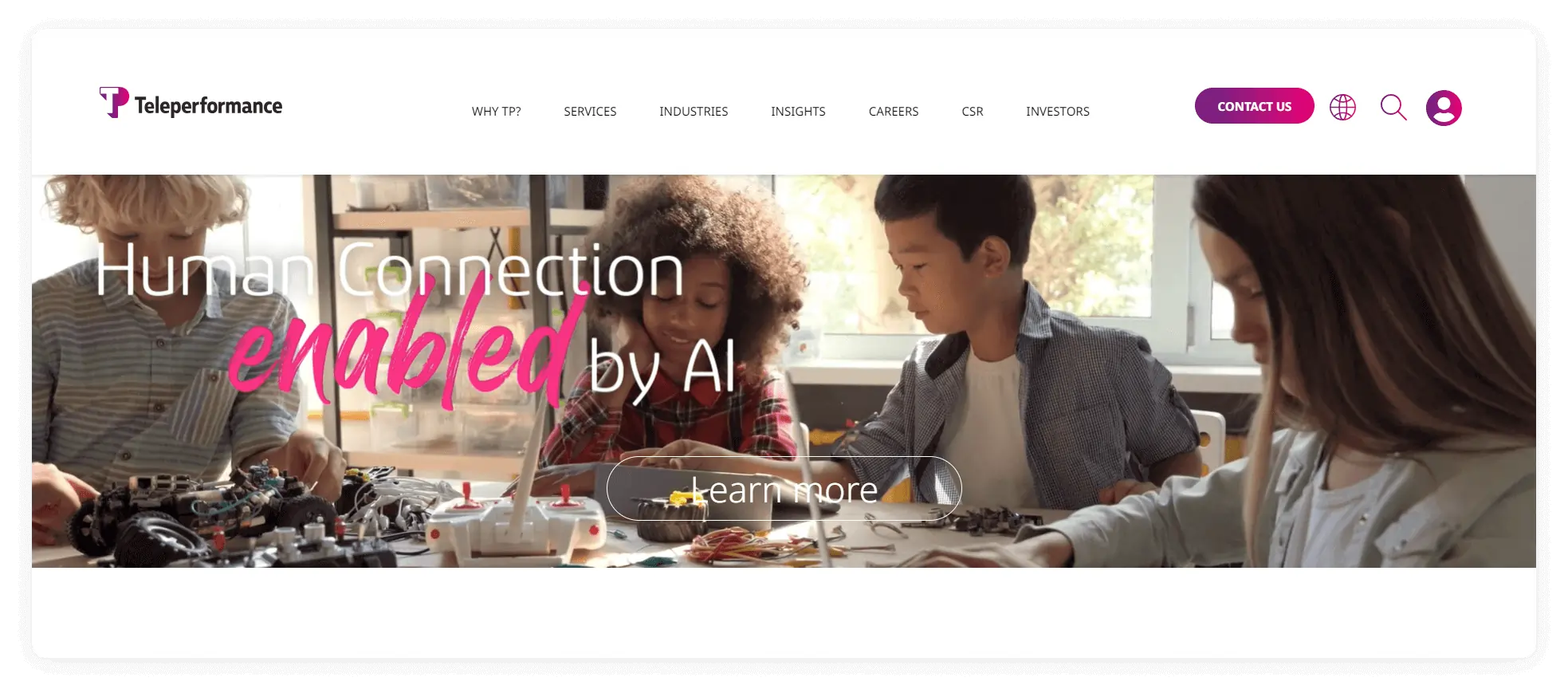
Concentrix
Convergys, now part of Concentrix following a significant acquisition, is recognized for its extensive service offerings that include call handling, customer management, and information management. Based in the United States, Convergys has a presence in 33 countries and serves clients across telecommunications, retail, and technology sectors. The company has gained recognition for its robust training programs that ensure high-quality service delivery.

Alorica
Alorica is a U.S.-based company that provides a wide range of services, including client service, financial solutions, and health services. With operations across North America, Latin America, and Asia, Alorica is known for its services that cater to the specific needs of clients. The company serves clients such as Comcast and T-Mobile, highlighting its expertise in handling large-scale operations and complex service requirements.
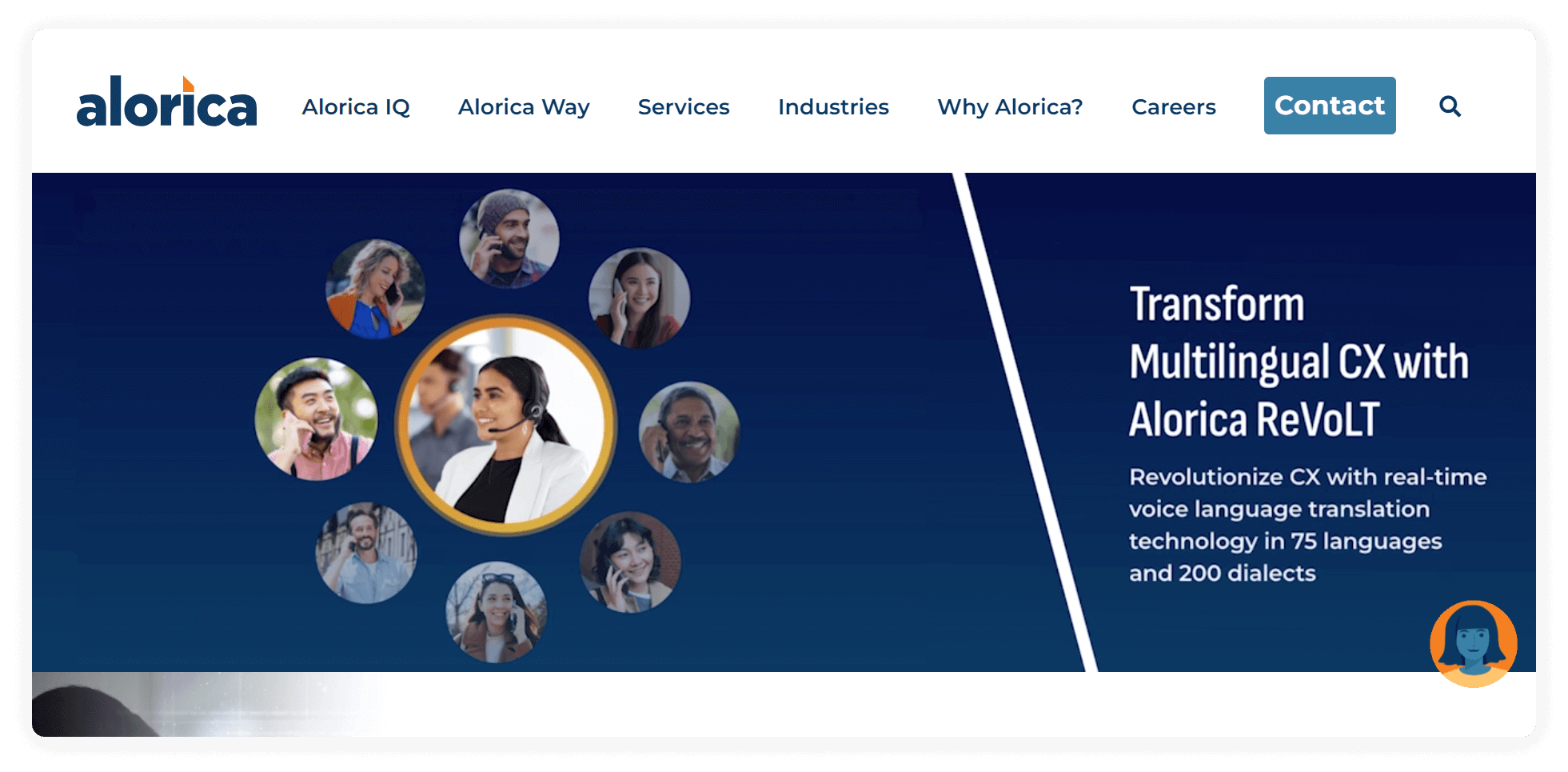
Foundever
Foundever specializes in providing customer experience management services globally. With facilities in 27 countries, Sitel offers multilingual support and has outsource call center operations expertise across various sectors including banking, healthcare, and consumer electronics. Noteworthy achievements include innovative “work at home” solutions and recognized leadership in customer loyalty strategies. Clients include well-known brands like HP and Expedia.
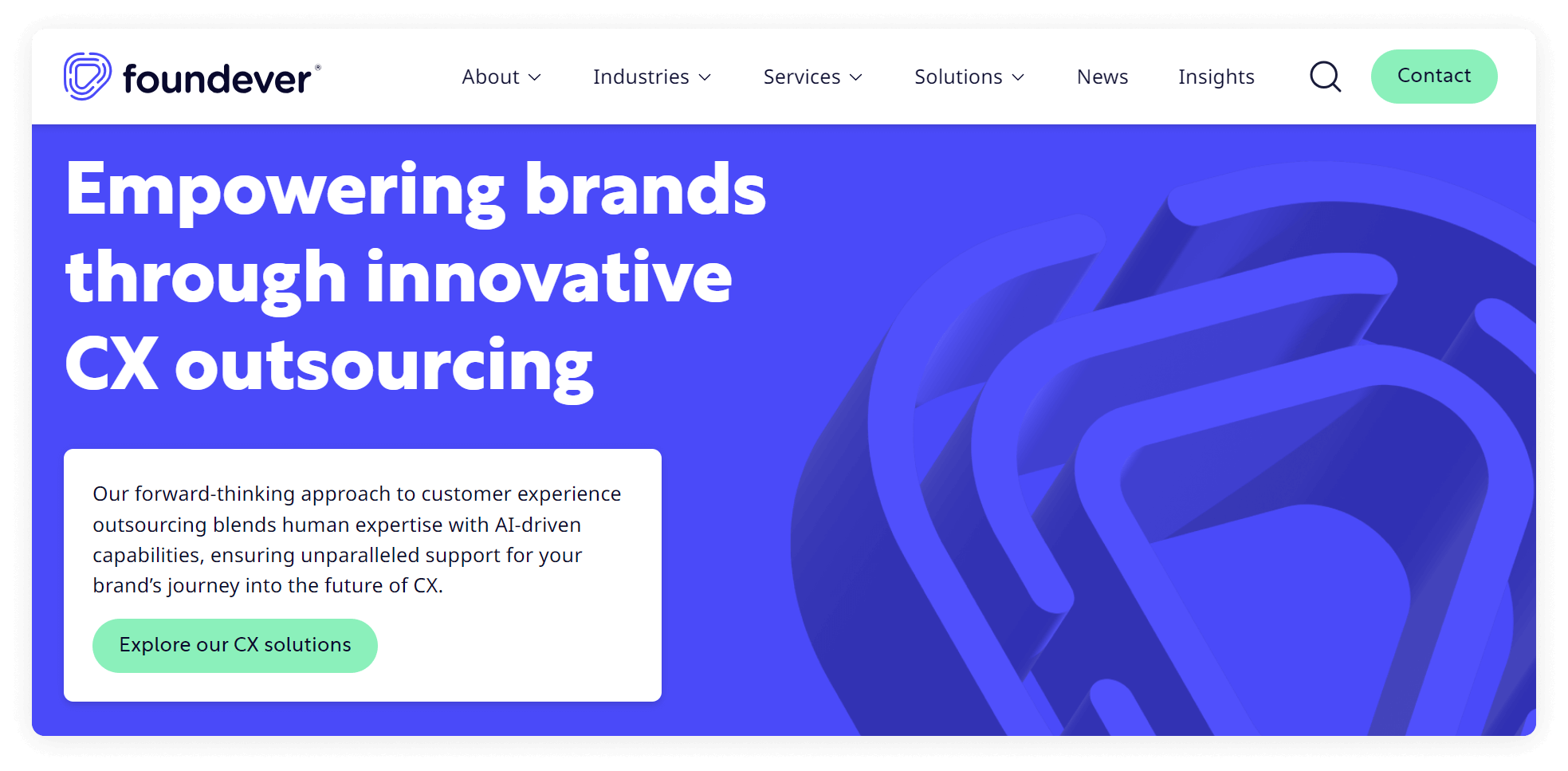
Genpact
Originally a unit within General Electric, Genpact has grown into an independent company that focuses on process outsourcing and management. With a strong presence in countries like India, the Philippines, and the United States, Genpact offers services ranging from customer service to financial consulting. Its client list includes Fortune 500 companies, showcasing its capability to deliver process-driven results for major global corporations.
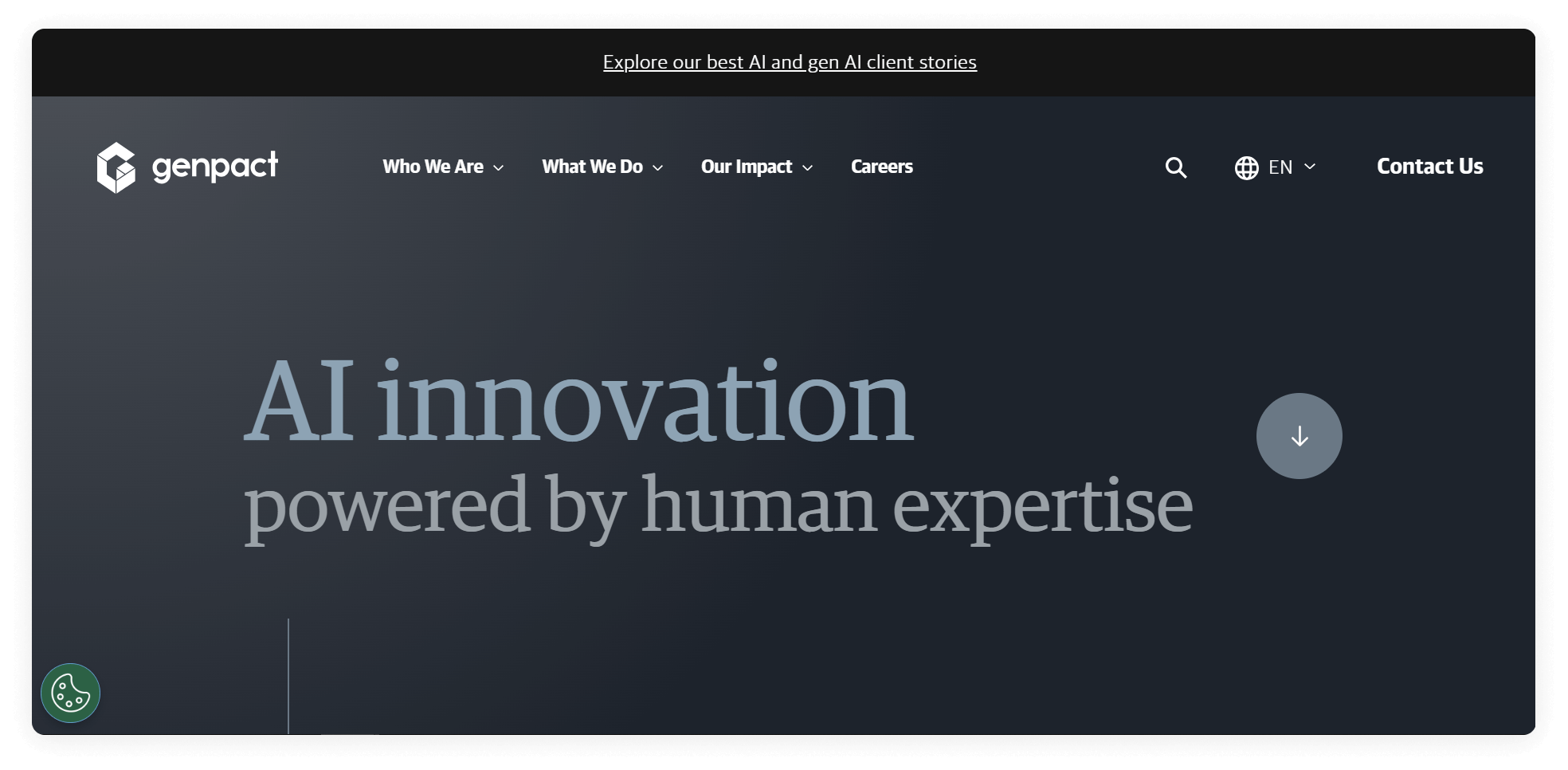
How to choose the best company to outsource your call center
Choosing the right call center outsourcing partner is how you ensure your clients are happy and sales run smoothly. Here’s a step-by-step guide to help you select the best outsourcing company:
1. Assess experience and industry expertise:
Start by evaluating the experience of potential outsourcing partners. Look for companies with a proven track record in your specific industry. This ensures they understand your market’s unique challenges and customer expectations. Reviewing case studies or client testimonials can provide insights into their capabilities and the results they’ve achieved for other clients.
2. Evaluate technology and features:
The technology infrastructure of the outsourcing partner should be advanced enough to support your needs. Check if they use the latest in call center technology, such as artificial intelligence (AI), omnichannel communications, and data security measures. This will ensure they can provide high-quality service and handle interactions.
3. Consider scalability:
The ability to scale services up or down based on your business needs is essential. Choose a customer call center outsourcing solution that can accommodate fluctuating call volumes without compromising service quality, ensuring flexibility as your business grows or faces seasonal spikes.
4. Cultural fit:
Cultural alignment between your company and the outsourcing partner facilitates smoother interactions and a better understanding of your business objectives. Evaluate their corporate culture and training programs to ensure they can align with your values and effectively represent your brand to customers.
5. Examine pricing structures:
Compare pricing models from different providers to find the best match for your budget and service level requirements. Look for transparent pricing structures to avoid hidden costs. Opt for call center outsourcing that offers a balance between cost and quality of service.
6. Check references and reviews:
Finally, speaking directly with current or past clients can give you a clearer picture of what it’s like to work with the provider. Ask about their experience regarding the provider’s responsiveness, reliability, and ability to deliver on promises.
How to measure the effectiveness of outsourcing?
Evaluating the success of outsourced services involves tracking various key performance indicators (KPIs) that reflect the quality of the services provided. These metrics help determine if outsourcing is meeting the expected goals:
1. Customer satisfaction (CSAT):
This indicator measures how satisfied customers are with the service they received. Usually assessed through post-interaction surveys, high CSAT scores suggest that the contact center outsourcing is effective for customer queries and concerns.

2. Average handle time (AHT):
AHT tracks the total average duration agents spend on a phone call, including conversation, hold time, and any related follow-up tasks. This metric is essential for assessing the performance of agents; however, it must be balanced with quality assurance to ensure quality customer support.

3. First call resolution (FCR):
FCR measures the percentage of calls resolved without the need for a follow-up. A high FCR is often indicative of a successful contact center outsource, contributing to higher customer satisfaction as issues are resolved swiftly in a single interaction.

4. Cost per contact:
This KPI calculates the total cost involved in managing each customer interaction, incorporating labor, technology, and overhead costs. It’s critical for analyzing the financial impact of outsourcing customer service.

5. Agent satisfaction average (ASA):
ASA indicates the average time a caller waits in the queue before being connected to an agent. Lower ASA times are preferable, reflecting better productivity as callers are not kept waiting.

Outsourcing call center services can be the solution
Contact center outsourcing services allow businesses to provide high-quality, consistent customer support while managing costs. By partnering with specialized providers, companies gain access to expert agents, advanced technology, and scalable solutions for fluctuating demands.



